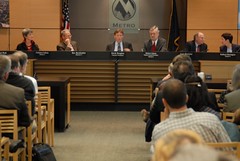This morning, Metro’s Joint Policy Advisory Committee on Transportation voted 14-3 in support of the Regional Transportation Plan (RTP). Portland Mayor Sam Adams had an amendment to the plan rejected 11-5 and was one of the three “no” votes.
The RTP contains a list of over 600 transportation infrastructure projects at a total price tag of $20 billion. The plan has come under fire from bicycle and environmental advocacy groups (it even earned a “Rogue of the Week” award from The Willamette Week) because, if the project list was built out, it would increase greenhouse gas emissions by 50% and run afoul of our region’s emissions reduction goals.
Despite this, as we reported in more detail last month, Metro defends their plan and the highway/road-heavy project list, saying they’re necessary to accommodate future population growth and to connect suburban and rural roads. Metro has also acknowledged that the modeling used to project GHG emissions is currently not as precise as it should be.
“To deal with growth in a way that keeps our city intact we are going to have to push the envelope and invest in projects that don’t just expand roads.”
— Catherine Ciarlo, Mayor Adams’ transportation policy advisor
Portland Mayor Sam Adams has made it clear he wouldn’t support it unless more was done to analyze and address these GHG emissions concerns. At a meeting of Metro’s Policy Advisory Committee (MPAC) on November 18th, Adams (and his City Council colleague Amanda Fritz) proposed an amendment asking Metro to do more analysis of the projects and label them according to expected emissions impact. Here’s a snip from the amendment:
“The direction to Metro staff above provides a process for improving the GHG projections and better understanding how certain transportation investments may adversely affect our ability to meet regional GHG reduction targets.”
The Adams amendment was approved by MPAC, who then passed along the recommendation to JPACT. Today it was JPACT’s turn to vote up or down on the amendment. According to Adams’ Transportation Policy Advisor Catherine Ciarlo (who’s publishing updates from the meeting via Twitter), they voted against the amendment 11-5.
The Oregonian has published an article today that gives some context to Adams’ amendment and explains why it was not likely to survive. From the Oregonian:
“…some elected officials [like those from more suburban/rural areas like Washington County] fear a carbon rating on road projects could amount to a Scarlet Letter – unfairly labeling a project that might have otherwise worthy attributes….
Metro councilors and planners say they’re not sure how to do a project-by-project carbon analysis. Trying to do so could delay approval of the project list and risk losing federal funding.”
But, according to Ciarlo, Adams said at the JPACT meeting today that, “We can find the time, money and resources to do it now.” and, “we have the ability to push ourselves on climate change. And we must.”
However, despite Adams’ pep talk, JPACT voted 14-3 in favor of moving forward with the RTP in its current form. Joining Adams in voting no were Washington County Commissioner Roy Rogers and Tigard Mayor Craig Dirksen (both made it clear they were voting no for different reasons than Adams).
In an interview with Catherine Ciarlo after the meeting, she said the City of Portland will “move forward as fast as it can” to do emissions analysis on its own projects. She also said Adams will push Metro to complete a new GHG emission analysis and modeling tool that is currently under development.
I asked Ciarlo whether Adams’ call for more analysis is more about sincerely wanting more information about GHG emissions or whether it was about simply being opposed to certain highway projects:
“I wouldn’t say it’s one or the other. To deal with growth in a way that keeps our city in tact we are going to have to push the envelope and invest in projects that don’t just expand roads.”
But is it fair, I asked, for Adams — who oversees a City with a relatively dense, grid road network that already has streetcar, light rail, and a bike network — to expect his rural and suburban counterparts to share his perspective on emphasizing emissions reduction in transportation project decisions?
“We would like to see our regional partners head in that direction as well and one key piece in heading in that direction is understanding the impact of our decisions. Sam is the first person who would acknowledge the differences in Portland versus other cities in our region… But as a region, we’re asking for decisions based on information… Climate change will affect all of us similarly. It’s in our interest as a whole region to tackle this together.”
Adams’ maneuvering on the RTP is quite similar to his stance against the Columbia River Crossing (except in that battle, he’s allied with Metro). In both cases Adams is saying we should take more time before investing so much in projects that don’t meet our stated emissions targets. Adams’ fight against the RTP also puts him in a strange juxtaposition with Metro Councilor Rex Burkholder. Burkholder is Metro’s lead on the RTP, and this public disagreement by Adams happens as Burkholder is in a campaign for Metro president — a campaign that lists Mayor Adams as an official supporter. Politics makes strange bedfellows. (UPDATE: More on this tension between Adams and Burkholder over on the Portland Mercury blog.)
From here, the RTP will move to a vote from the Metro Council on December 17th. They are expected to vote in line with JPACT’s recommendations. Stay tuned to the Front Page for a list of all the non-motorized transportation projects included in the RTP.
For more coverage of today’s meeting, check out the story on The Portland Mercury blog.


